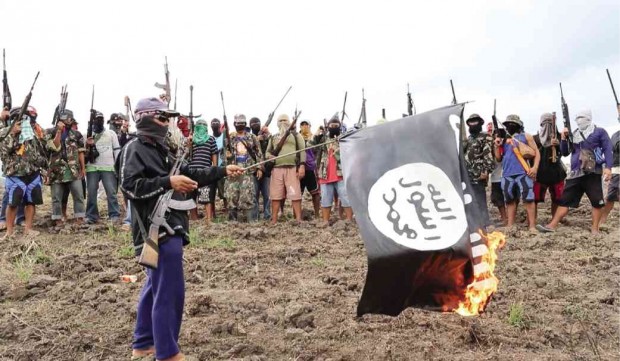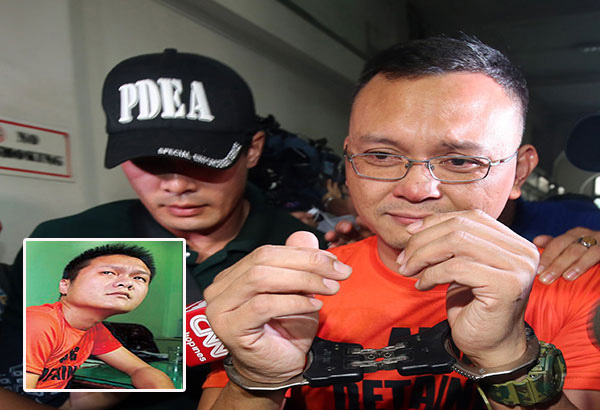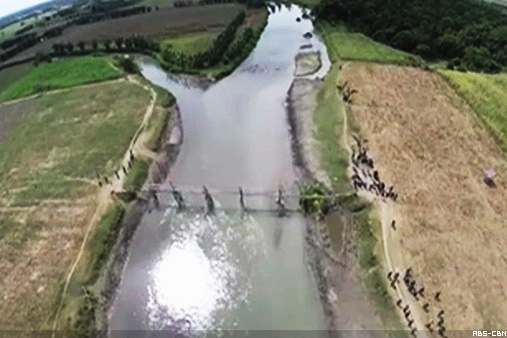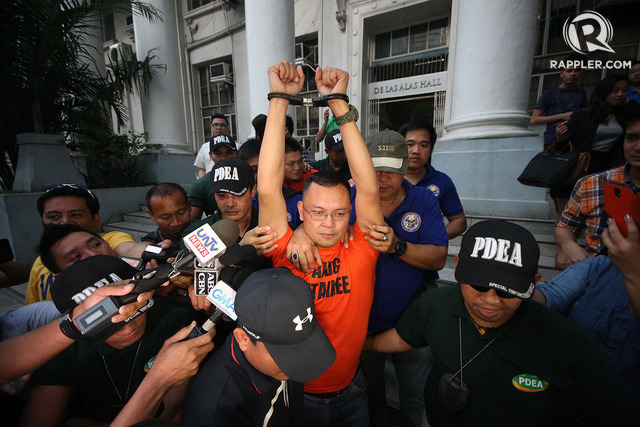
Somewhere on the hills of Central Mindanao, a group of armed men, clad in scrappy and worn-out shirts and camouflage gear, patrol a farming village under the heat of the midday sun.
"We are not an assault force," said a man in his 50s, identifying himself only as Brother Asiong. "We just want to defend our land."
They call themselves "Pulahan" or “Red Warriors of God” — inspired by a vigilante group with the same name that once gained notoriety in Mindanao in the 1990s.
The group, whose members are mostly farmers, was organized to fight communist and Moro rebel groups who frequently preyed on their communities, collecting food and revolutionary taxes at will.
Instead of rakes, hoes, and shovels, most of them now carry weapons. They are constantly on the lookout for the Bangsamoro Islamic Freedom Fighters (BIFF), and those claiming allegiance to the international terrorist group ISIS.

The Pulahan say their armed members regularly patrol their farming communities to defend it against intrusion from other groups who want to drive them away and take control of their lands.
The Pulahan wants to stop the BIFF, and possibly ISIS, from advancing into their communities after the militants killed at least five farmers in a remote Maguindanao community last Christmas Eve.
Civilian armed group rises: Aims to defend residents against BIFF, ISIS
The BIFF said armed civilians have now become their targets.
In a chilling warning, BIFF spokesperson Abu Misry Mamah told CNN Philippines by phone that they consider civilian community defenders as combatants they can engage in a gunfight. "If a civilian is armed and is tolerated by authorities, he becomes part of the government, and thus, should be considered our enemy as well," he said.
Watch: Cotabato vigilante group on alert vs. rebels
The Pulahan members,who are fewer than a hundred, are armed only with bolos, hunting rifles and old AK-47s, far inferior to the better-armed rebels.
"This firearm I am holding came from them,” Asiong said, brandishing his old locally-made AK-47 that was obtained from Moro rebels.
"How can we produce something like this, I am just a farmer?" he said. "Our firearms were just pawned to us. And since we needed them for our defense, we decided to keep them."

Masked and armed members of Pulahan shout "Long Live, Pulahan!" during a gathering somewhere in Maguindanao on Tuesday (Jan 19).
Brother Asiong said arming themselves to defend their communities was the last thing farmers wanted to do. But their survival is at stake, and they have run out of options, he said.
He said their efforts to protect their land should complement the job of security forces, not replace it.
The cause of the conflict
Asiong admits, the conflict in their communities began as a land dispute between mostly native Maguindanaons and Ilonggo migrants.
The discord has been complicated over the years by the violence fueled by terrorist groups and religious extremists who want to advance their own agenda.
The Pulahan fears the conflict could escalate into a full-blown persecution of non-Moros in the predominantly Muslim province and anti-Christian attacks by ISIS sympathizers.
On Tuesday, the Pulahan gunmen burned a replica of the ISIS flag, to dramatize their will to fight the jihadist group.

Members of Pulahan burn a replica of the ISIS flag, as a symbolic gesture to warn the jihadist group against intruding their communities.
Maguindanao Gov. Esmael Mangudadatu, however, warns the Pulahan against resorting to arms.
"They don't have to do that," Mangudadatu said. "They can't say they are going to fight the ISIS because the group doesn't exist here in the first place."
Related: Aquino: No credible terror threat in PH
Mangudadatu said the conflict should not stray away from its origins – land disputes.
The governor said he has been working to resolve this conflict with help from other government agencies and the courts.
Under the Maguindanao Task Force on Reconciliation and Unification (MTFRU), an inter-agency task group was formed to dig deeper into the long-drawn-out land disputes.
The Maguindanaons and the migrants have been clashing for years for control of several hectares of rice and corn fields.

After patrolling their farm lands while on the lookout for the Bangsamoro Islamic Freedom Fighters (BIFF), followers of Pulahan share a boodlefight meal consisting of fish, vegetables and rice. As part of their belief, they are prohibited from eating pork or meat from any four-legged animal during Tuesdays and Fridays. They are also barred from smoking, drinking Iiquor and having extra-marital affairs.
The MTFRU has been holding regular dialogues with land titles holders and claimants to verify the authenticity of their documents and look into their claims.
Proposals for a peaceful settlement of the conflict through compromise agreements have been made, including sharing revenues from the farm produce. Others, however, have opted for court settlements.
"What matters to us is that government should determine with finality who owns these farmlands," Brother Asiong said. "Do these belong to them (Maguindanaon claimants) or to us?"
"We are willing to turn these lands over to them, as long as they do not resort to violence. We are willing to comply with settlements coursed through the legal processes," he said.

A religious leader of Pulahan (Red God's soldiers) performs a ritual of prayer on their followers to seek divine power in carrying out their mission. They believe amulets and potions will protect them from enemies' harm. The ritual is performed every Tuesday and Friday.
The protracted dispute has killed both Muslim and Christian residents. More than 10 people have been killed in separate attacks since November. The Pulahan claims that about 60 Christians have been killed due to the conflict over the past years. CNN could not immediately confirm the death tolls.
Mangudadatu insists the conflict has nothing to do with religion.
"Christians are not persecuted here because Muslims have been killed, too,"
Mangudadatu said. "And let us avoid dragging the ISIS into this conflict because ISIS isn’t even here... I am hoping ISIS will not come into the province at all."
http://cnnphilippines.com/regional/2016/01/22/central-mindanao-conflict-land-dispute-pulahan.html












